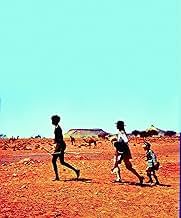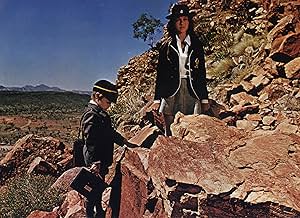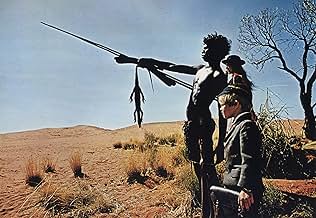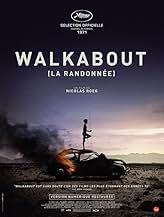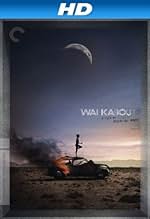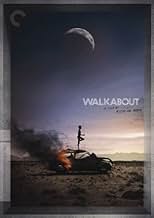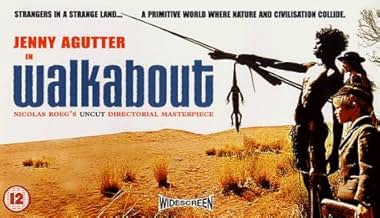Due fratelli cresciuti in città sono bloccati nell'entroterra australiano, dove imparano a sopravvivere con l'aiuto di un ragazzo aborigeno durante la così detta passeggiata, una separazione... Leggi tuttoDue fratelli cresciuti in città sono bloccati nell'entroterra australiano, dove imparano a sopravvivere con l'aiuto di un ragazzo aborigeno durante la così detta passeggiata, una separazione rituale dalla sua tribù.Due fratelli cresciuti in città sono bloccati nell'entroterra australiano, dove imparano a sopravvivere con l'aiuto di un ragazzo aborigeno durante la così detta passeggiata, una separazione rituale dalla sua tribù.
- Premi
- 1 vittoria e 1 candidatura in totale
- Black Boy
- (as David Gumpilil)
- Man
- (as Robert McDara)
- No Hoper
- (as Pete Carver)
- German Scientist
- (as Noelene Brown)
- Radio Announcer
- (voce)
- (non citato nei titoli originali)
Trama
Lo sapevi?
- QuizLuc Roeg was actually sun-burnt in the scene where the aboriginal boy treats his back by rubbing him with fat from a wild boar. Director Nicolas Roeg thought it would make a good scene for the film so he picked up the camera and shot it.
- BlooperThe credits name the actor playing "Black Boy" as David Gumpilil. It should be David Gulpilil.
- Citazioni
Narrator: [last lines - from "Poem XL" by A.E. Housman's "A Shropshire Lad"] Into my heart an air that kills, From yon far country blows: What are those blue remembered hills, What spires, what farms are those? That is the land of lost content, I see it shining plain, The happy highways where I went, And cannot come again.
- Curiosità sui creditiAfter the credits, there is a flash of white light on the screen and as it becomes a black screen, radio tuning is heard while the words "rien ne va plus" are shown.
- Versioni alternativeA director's cut of this movie was released in 1997 with 5 additional minutes. This cut is identical to the original British release version (100 minutes): the film was shortened by five minutes for its original American release.
- ConnessioniEdited into Terror Nullius (2018)
The experiences between these three young people form the balance of this excellent film. The culture clash is immediate, as the two urbanized white kids struggle to make themselves understood by the aborigine. But they ultimately become rather inseparable.
Along the way, they encounter all sorts of flora and fauna. "Walkabout" is highly noteworthy for its respect for Nature, and is filled with many visual wonders. Given that director Nicolas Roeg had been a camera operator and cinematographer, it's no surprise that the film *looks* beautiful, and it's set to a haunting and lovely John Barry score.
Three highly engaging performances anchor the film. Agutter has a naturally sexy presence, and Roeg doesn't miss opportunities to let the camera take in every aspect of her body. His son does a nice job as the brother, avoiding being overly cutesy and always relaxed on screen. Gulpilil proved to be a real find in his film debut. Another Aussie favourite, John Meillon, appears briefly as the white kids' father.
"Walkabout" was largely improvised. The Edward Bond script, based on a novel by Donald G. Payne, was actually only 14 pages or so. Knowing this, it makes the acting that much more impressive, as the cast react instinctively to the scenes & settings.
Overall, this is one of *the* iconic Australian films, and is a must-see for movie lovers interested in cinema from this part of the world.
Eight out of 10.
- Hey_Sweden
- 2 nov 2020
- Permalink
I più visti
Dettagli
- Data di uscita
- Paesi di origine
- Lingue
- Celebre anche come
- Walkabout
- Luoghi delle riprese
- Aziende produttrici
- Vedi altri crediti dell’azienda su IMDbPro
Botteghino
- Budget
- 1.000.000 A$ (previsto)
- Lordo in tutto il mondo
- 1.888 USD
Contribuisci a questa pagina



